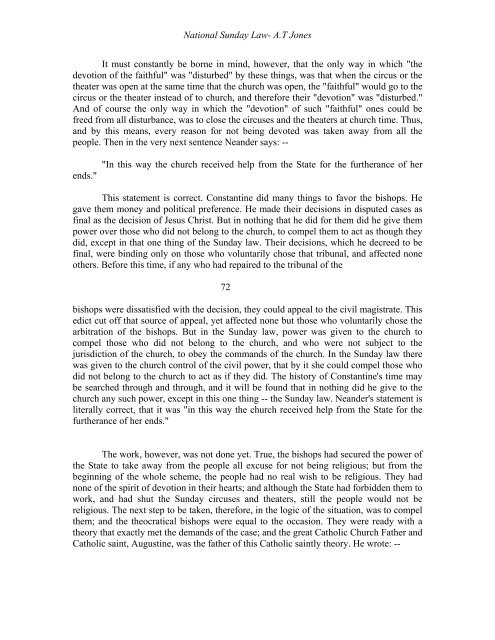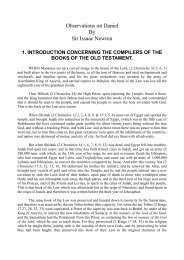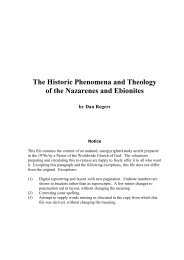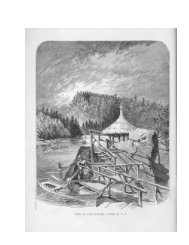THE NATIONAL SUNDAY LAW, ARGUMENT OF ALONZO T ...
THE NATIONAL SUNDAY LAW, ARGUMENT OF ALONZO T ...
THE NATIONAL SUNDAY LAW, ARGUMENT OF ALONZO T ...
Create successful ePaper yourself
Turn your PDF publications into a flip-book with our unique Google optimized e-Paper software.
National Sunday Law- A.T Jones<br />
It must constantly be borne in mind, however, that the only way in which "the<br />
devotion of the faithful" was "disturbed" by these things, was that when the circus or the<br />
theater was open at the same time that the church was open, the "faithful" would go to the<br />
circus or the theater instead of to church, and therefore their "devotion" was "disturbed."<br />
And of course the only way in which the "devotion" of such "faithful" ones could be<br />
freed from all disturbance, was to close the circuses and the theaters at church time. Thus,<br />
and by this means, every reason for not being devoted was taken away from all the<br />
people. Then in the very next sentence Neander says: --<br />
ends."<br />
"In this way the church received help from the State for the furtherance of her<br />
This statement is correct. Constantine did many things to favor the bishops. He<br />
gave them money and political preference. He made their decisions in disputed cases as<br />
final as the decision of Jesus Christ. But in nothing that he did for them did he give them<br />
power over those who did not belong to the church, to compel them to act as though they<br />
did, except in that one thing of the Sunday law. Their decisions, which he decreed to be<br />
final, were binding only on those who voluntarily chose that tribunal, and affected none<br />
others. Before this time, if any who had repaired to the tribunal of the<br />
72<br />
bishops were dissatisfied with the decision, they could appeal to the civil magistrate. This<br />
edict cut off that source of appeal, yet affected none but those who voluntarily chose the<br />
arbitration of the bishops. But in the Sunday law, power was given to the church to<br />
compel those who did not belong to the church, and who were not subject to the<br />
jurisdiction of the church, to obey the commands of the church. In the Sunday law there<br />
was given to the church control of the civil power, that by it she could compel those who<br />
did not belong to the church to act as if they did. The history of Constantine's time may<br />
be searched through and through, and it will be found that in nothing did he give to the<br />
church any such power, except in this one thing -- the Sunday law. Neander's statement is<br />
literally correct, that it was "in this way the church received help from the State for the<br />
furtherance of her ends."<br />
The work, however, was not done yet. True, the bishops had secured the power of<br />
the State to take away from the people all excuse for not being religious; but from the<br />
beginning of the whole scheme, the people had no real wish to be religious. They had<br />
none of the spirit of devotion in their hearts; and although the State had forbidden them to<br />
work, and had shut the Sunday circuses and theaters, still the people would not be<br />
religious. The next step to be taken, therefore, in the logic of the situation, was to compel<br />
them; and the theocratical bishops were equal to the occasion. They were ready with a<br />
theory that exactly met the demands of the case; and the great Catholic Church Father and<br />
Catholic saint, Augustine, was the father of this Catholic saintly theory. He wrote: --
















